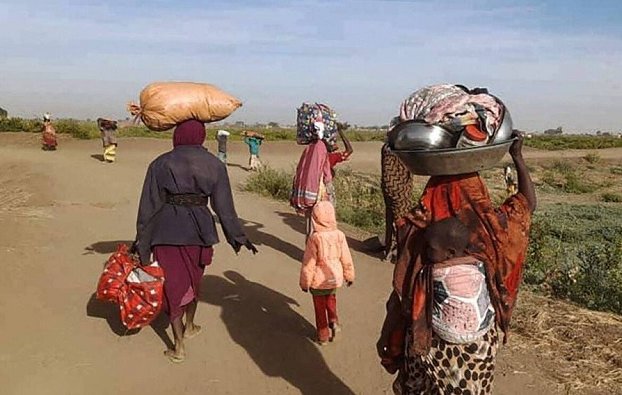KHARTOUM | Along the rugged road from El Fasher to Tawila in Sudan’s North Darfur, thousands of civilians barefoot, weary, and silent carried what little remained of their lives. They fled a city consumed by fire and gunfire, each step driven by a fragile hope for survival.
Under the scorching sun, families moved in scattered groups. The cries of the bereaved mingled with the moans of the wounded. Among them was 70-year-old Haj Abdullah Omer, who reached Tawila’s outskirts after three days on foot.
“I never thought I’d live to see this day,” he said. “We left El Fasher at dawn bullets behind us, fire all around. I lost two of my grandchildren along the road. I couldn’t stop people were running in every direction.”
Ahmed Al-Nour, a medical worker from El Fasher, carried a small first aid bag as he walked with civilians. “I tried to help whoever I could,” he said. “On the second day, we found a girl, maybe 10 years old, hit by shrapnel. I tried to stop the bleeding, but she died in my hands.”
For those covering the 70 kilometers between El Fasher and Tawila, the journey was measured in agony, not distance. Words were a luxury. Only the sound of trudging feet, children’s sobs, and distant explosions filled the air.
The International Organization for Migration reported that over 62,000 people fled El Fasher within four days after the Rapid Support Forces seized the city. Many ended up in Tawila, displaced, wounded, and waiting.
The town, once quiet, now overflows with survivors. Families sleep on bare earth or beneath trees, while aid workers race to deliver water, food, and medical care. “People arrive in terrible condition,” said Adam Abbakar, a local volunteer. “Children are in shock. The elderly can hardly speak.”
A handful of torn tents on the outskirts serve as makeshift clinics. Inside, the air is thick with the scent of medicine, sweat, and smoke. Dr. Mohammed Al-Tayeb described the scene:
“What we’re doing here isn’t real treatment… it’s just keeping people alive until help comes. We have unstitched wounds, medicines running out, and patients who need surgeries we can’t perform.”
Around him, survivors cling to life. Smoke and dust drift through the tents, carrying the sharp scent of endurance. Even a simple bandaged wound or whispered prayer becomes an act of defiance against despair.
